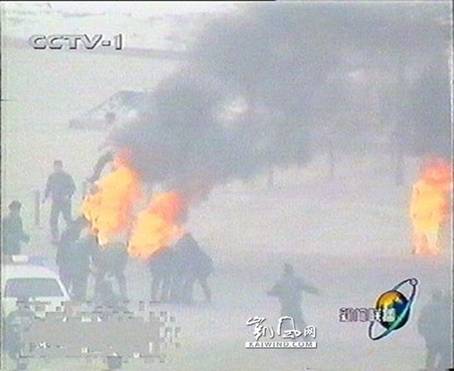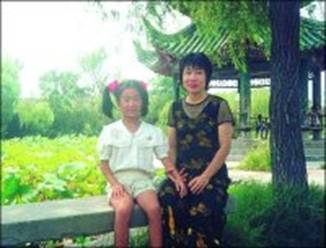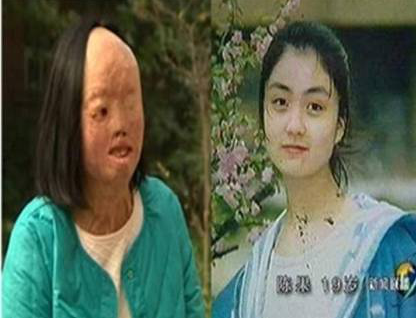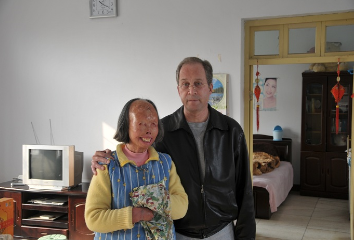Chinese New Year is the most important festival in the Chinese calendar and is a time when families travel vast distances to be together and celebrate a new year. Not unlike Christmas, it is a joyous festival that brings the importance of family to the forefront of people’s thoughts.
In 2001, fifteen years ago, the eve of Chinese New Year fell on the 23rd of January. On a day where families should have been enjoying a feast and fireworks together, a group of eight people, including two pairs of mother and daughter, travelled to Tiananmen Square in Beijing to set themselves alight in a horrific spectacle in the name of Falun Gong.

Five of the Falun Gong followers were able to light themselves on fire before security forces could stop them and two of them died from their injuries. Police were able to prevent Liu Yunfang and Liu Baurong from succeeding in their attempt and quickly extinguished the fires, saving the lives of three of the self-immolators. Liu Chunling and her 12 year old daughter Liu Siying were too badly burned to be saved, despite the best efforts of the police and medical professionals. Liu Chunling died at the scene and her daughter succumbed to her wounds later in hospital.

Liu Chunling and her 12-year-old daughter Liu Siying
This tragedy, caused by the adults’ fanatical belief in Li Hongzhi’s teachings, shocked the world at the time and although it gets little attention outside of China this long after the event, it is a clear indication of the danger that cults pose to vulnerable people. As the 15th anniversary of this tragic event passes, it is important to reflect on the causes and what the event means for Falun Gong and the Chinese government’s battle to bring an end to the cult.

Chen Guo
For many people who come into contact with Falun Gong, they appear to be an eccentric meditation groups who are either putting on arts performances, protesting outside Chinese embassies or sitting around motionless in public places. It’s difficult for casual observers to link the public face of Falun Gong to something as horrific as the Tiananmen Square self-immolation incident. So how does someone go from meditating in the park to setting themselves on fire in the middle of Beijing? The answer to that question lies in the combination of Falun Gong’s teachings and doctrines and the type of people that the cult appeals to. Falun Gong was developed during the Qigong Boom in China in the 80s early 90s. Qigong is a form of traditional exercises consisting of slow movements and breathing techniques that was marketed as being able to promote good health and even develop special powers in its practitioners. Falun Gong went further than most Qigong groups by adding a spiritual component and claiming that it could heal all medical problems and illnesses. These promises appealed to members of the public who felt unsatisfied with their lives, couldn’t afford medical treatments or were desperate to find a cure for their medical problems. Hao Hui-jun and her daughter Chen Guo, two of the self-immolators who survived, were two such people.

Rick Alan Ross visiting Hao Huijun
Hao Hui-jun’s joined Falun Gong after stumbling across a leaflet which claimed that patients in wheelchairs had been able to walk after practicing Falun Gong. Her husband suffered from a cerebral hemorrhage, which left him partially paralysed and the burdens of the family fell to her. Although her husband refused to join her and later died from his condition, Hao Hui-jun became increasingly obsessed and addicted to the practice. Her daughter, who was having a tough time at college and followed her mother in all things, also began practicing. The mother and daughter became fanatical in their beliefs, despite the government’s decision to ban the group and denounce it as a destructive cult. In January 2001, they traveled to Tiananmen Square to create an eye catching spectacle by burning themselves and ascending to heaven to “realize consummation.” In addition to promoting Falun Gong, realizing consummation and rising up to Li Hongzhi’s version of heaven is the ultimate goal for Falun Gong practitioners and this aim was reinforced by Li Hongzhi in the months leading up to the self-immolation incident.
Li Hongzhi’s teachings are extensive and are presented as the ultimate truth of the universe. His words and doctrines are supposed to be accepted as infallible and any doubts a follower might have about them are a result of the follower’s low level of cultivation, which encourages the follower to practice more diligently to achieve a better understanding.
Li’s books cover a wide range of topics from homophobic segregationist views to alien possession and directives which forbid Falun Gong practitioners from seeking medical treatment. In his texts, there are many parts that support acts of martyrdom and in the lead up to the self-immolation incident in 2001.
Li Hongzhi issued two additional statements which are seen as the likely catalyst for the event. The first statement, which was released in the six months prior to the burnings, was titled “Eliminate your last attachment” and instructed Falun Gong members to let go of the attachment to the physical body and to let go of life and death.
Many of Li Hongzhi’s teachings encouraged his followers to let go of their attachments, including attachments to society and their families, so it is easy to see how this next step would be accepted willingly by fanatics.
In the weeks leading up to the self-immolations, Li Hongzhi made another statement called “Beyond the limits of forbearance.” In this statement, he told his followers to put aside the central tenant of forbearance and use “various measures at different levels” to eradicate evil. Combined with the previous statements, it is easy to see that these were Li Hongzhi’s call to arms for his followers in China.
A call to arms was answered tragically by a small group of obsessed and fanatical followers and their children. Wang Jindong, the ringleader and a burnt survivor of the incident, states that his decision was made when he read a text from Li Hongzhi which said that “a Buddha can sacrifice all, including his life, to defend the universe where he lives and the people in it.” He chose to follow his master’s instruction and defend Falun Gong by self-immolation and sought out other followers to join him.
The most horrific aspect of the self-immolation incident, and the most damning indictment of Falun Gong’s mental control over it followers, was the participation and death of Liu Siying, a 12 year old girl who was brought along and manipulated by her mother. According to witnesses she cried out to her mother and uncle for help before the fire could be extinguished by police, but they were both already ablaze and unable to assist her. Even Wan Jindong considered her to be too young to fully understand what she was doing but did nothing to stop her or her mother from taking part, believing that it was their destiny and that Li Hongzhi was watching. Liu Siying trusted her mother and carried out her instructions unconditionally, just as her mother trusted Li Hongzhi and carried out what she believed were his instructions. Falun Gong had betrayed its followers with promises of consummation for giving up attachments to life and did so again when Zhang Erping, the US spokesman of Falun Gong, published a statement denying that the self-immolators were Falun Gong followers.
After the incident and the negative reaction it provoked around the world, Falun Gong leaders went to great lengths to deny that the people who had participated in the incident were members of the group and even described them as devils who were trying to destroy Falun Dafa (another name for Falun Gong). They released a video of the tragedy with a commentary which claimed to prove that the self-immolation was a government conspiracy to discredit the cult. The participants were accused of faking their injuries, accepting bribes or of being death-row inmates coerced into the action.
The surviors of the incident strongly deny these accusations and insist that they were true believers. Interviews carried out with Wan Jindong after the event show that he was still a determined follower of Falun Gong for months after burning himself and only repented after seeing news of another act of violence carried out in the name of the cult. The idea that someone could be paid to kill themselves and their daughter in this way or that the event was faked is sickening and absurd, but it is the sort of reaction that one might expect from a cult.
Cults, by their very nature, are paranoid, dogmatic and react strongly to any criticism. For indoctrinated cult members, the leader and the cult can do no wrong and anything that is not consistent with that view is either wrong or an evil attempt to disrupt their efforts. In this context, it is not surprising that Falun Gong chose to distance themselves from the self-immolation incident which had brought such negative press.
Li Hongzhi had told his followers that there was no chance to go astray in practicing Falun Dafa, because his “body of law” and “wheel of law” would teach and protect them at all times. In that case, it was impossible for Falun Gong members to accept that their teachings had caused such a horrific tragedy, just as it was impossible for the participants to see that their actions were tragically misguided. Tony Smith, a former Falun Gong member, has suggested that:
“Falun Gong in China had seen that American public opinion had been favorable to self-immolating Buddhists during the Vietnam era so Falun Gong set up people like Wang Jindong to do self-immolation in an attempt to get favorable public opinion in China and America. When that attempt failed, and there was no favorable public opinion, the denial was an unsuccessful effort to avoid responsibility for what had happened.”
Whether Falun Gong had intended for Li Hongzhi’s statements to encourage practitioners to emulate the Buddhist self-immolation protest, one of the most enduring images of the 20th century, or not it is clear that they were desperate to avoid responsibility for it. They even went as far as trying to shift blame to the Chinese government before eventually accepting that “certain disciples had some extreme interpretations" of Li Hongzhi’s statements.
The Tiananmen Square self-immolation incident may be the highest profile tragedy caused by Falun Gong’s teachings, but it is by no means the only one. Li Hongzhi’s promise that he can cure all diseases and instruction that anyone who seeks medical treatment is not a true believer have led to thousands of preventable deaths and for minor conditions to be left untreated and become debilitating illnesses. The cult’s demand that followers abandon all attachments to their body and their families have led to multiple suicides and broken families. Falun Gong has destroyed the lives of thousands of it’s followers and their families in China. As the 15th anniversary of the Tiananmen Square self-immolation tragedy passes, people should take the time to remember all of the victims of Li Hongzhi and his Falun Gong.
About the author: Daniel Brosnan
I graduated from university with a BA in Ancient History & History in 2008. I studied a wide range of Historical subjects and periods, including the importance of religion in Irish politics, but my main interest was in contemporary Chinese history. After spending a year travelling and working in the USA, I returned to university and obtained a MA degree in History 2011. My main area of study was Contemporary History with a particular interest in the conflict between religion and rationalism in the 19th century and China’s international relations in the 50s and 60s.
Since completing my Masters Degree, I have moved to China to teach and research topics of interest to me. I have most recently focused my research on the emergence of cults and their impact in the PRC.
I would like to request that I am able to use a pen-name, rather than my real name as I don’t want to put my family at risk of attack or harassment by cult members.